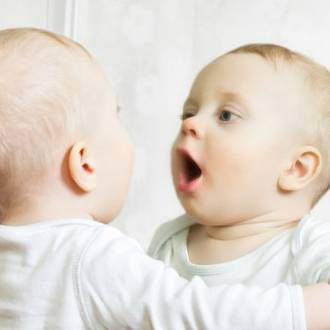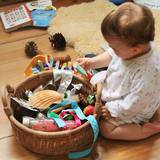Toddlers first sentences
|
You were really excited when your little one said their first word, but now what? When will they start to learn more words and say their first sentence? We take a look at typical first sentences and encouraging language development.
|
You might also be interested in ...
What's all the fuss about heuristic play?
Heuristic play is about playing with real-life, everyday objects and providing kids with an opportunity for open-ended discovery. When children are involved in heuristic play, they are using familiar objects in different ways. It is the process of exploring the different ways to use the objects that is important in the play.
Understanding disruptive behaviour
What constitutes ‘disruptive’ behaviour in young kids is very subjective. However, by looking deeper at your child’s behaviour it will help you understand more about why they act in a certain way. Behaviour that can appear ‘naughty’ or ‘disruptive’ to you, is often just your child’s way of communicating an unmet need as they try to figure out their way in the world.







When will they start to learn more words and say their first sentence?
Toddlers first sentences
You might expect that after their first word, your toddler's vocabulary will start to increase in leaps and bounds. Yet progress over the next few months can seem surprisingly slow.
If your toddler said their first word when they were one years old, they will typically only use 30-50 other words 6 months later.
However, by the time they reach 18 months there’s a ‘word explosion’ as they acquire an average of 6 new words a day!
When your toddler's vocabulary reaches 100 words, they will start to talk in phases and short sentences.
Toddlers typical first sentences
Your toddler’s first sentences are likely to be:
How toddlers sentences develop
Between your toddler’s 2nd and 3rd birthdays, what they say in sentences becomes much closer to what they are thinking.
For instance, they might include lots of smaller words such as ‘and’, ‘but’, ‘my’ and ‘am’. They then start to use plurals, past tenses, prepositions and other minor grammatical structures.
Instead of just nouns and verbs, your toddler will begin to speak with a broad range of grammatical structures, making their speech more closely resemble yours.
Your toddler will also start to use inflections, so for example, raising their voice at the end of a phrase to indicate a question.
Making mistakes
Expect your toddler to make plenty of mistakes while they improve their speech and language.
Sometimes, they may mix words up, get confused, mispronounce initial letter sounds, and even make up words that they’ve never heard you use.
Remember not to correct your toddler when they make these sorts of mistakes, or they may become unnecessarily anxious, resulting in a reluctance to speak. If you emphasise minor errors, they may think, “I’ll just keep quiet rather than be told off again.”
A more effective strategy is to say the correct words and phrases yourself, as if you’re agreeing with them rather than pointing out their mistake.
For example if they watch a bird fly away and says, “Birdie flowed way” you could say, “Yes, that’s right. The bird has flown away.”
Encouraging sentences & language development
There are lots of ways you can encourage your toddler to use sentences when they talk to you and help with their language development.
For example, react to your toddler’s sentences - look at your toddler when they talk to you, and try to make an appropriate response. They thrive on your attention.
Use a toy telephone - encourage imaginary conversations on a toy telephone, such as ‘phoning’ their grandparents or best friend.
Vary your speech - use alternative words for a concept, for instance, ‘large’ instead of ‘big’, ‘tasty’ for ‘nice’. They’ll instinctively start to use these words themselves.
More kids language development articles to enjoy:
- Speech development in preschool children
- Baby signing
- Advantages of raising bilingual kids
Image soure: motherforlife